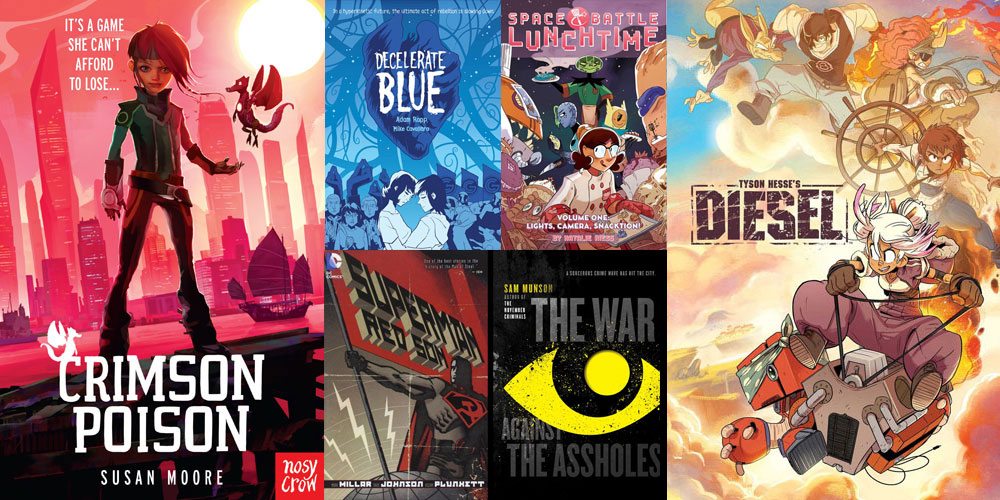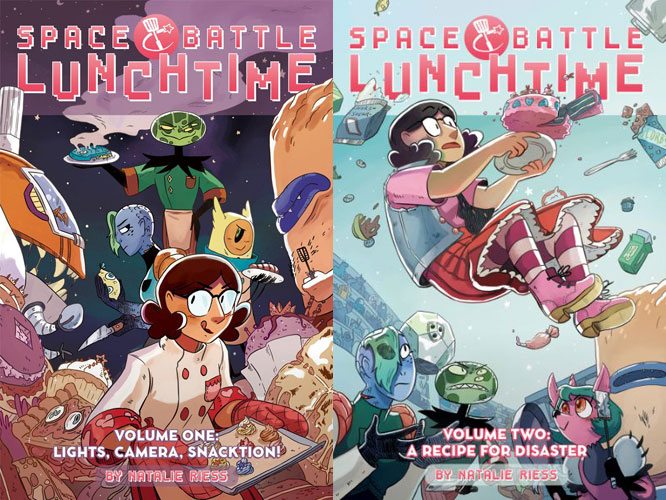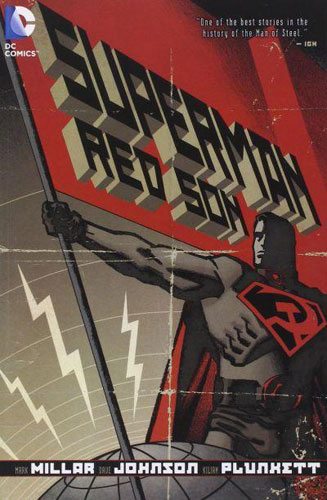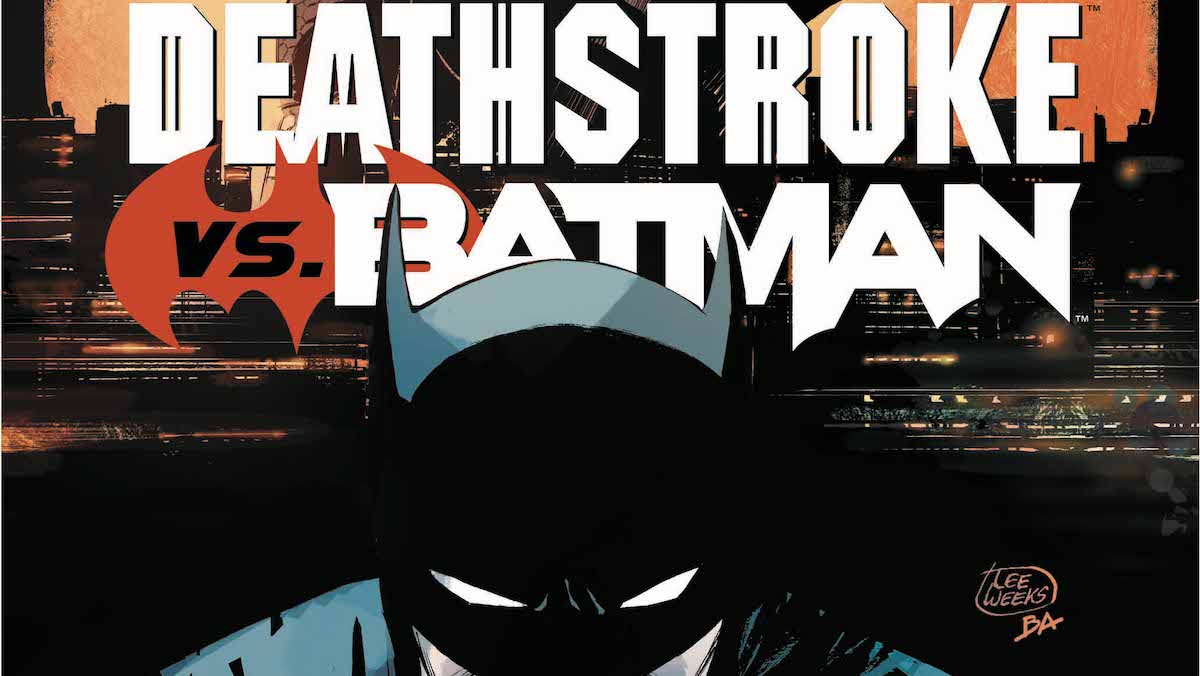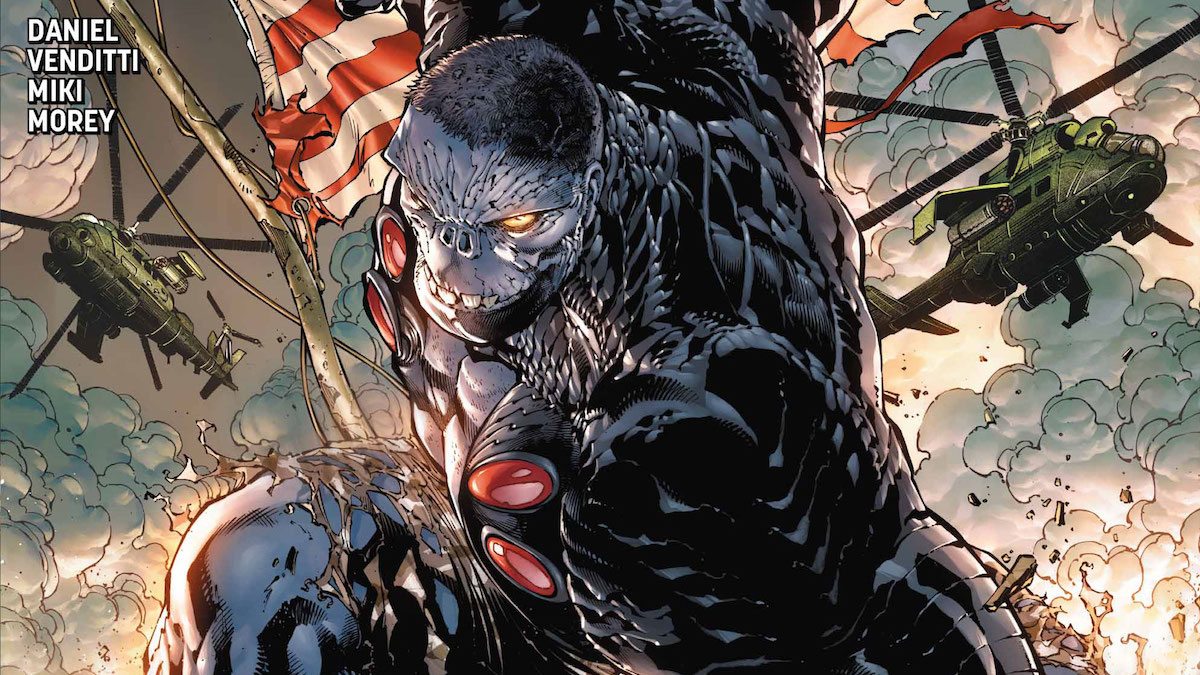One of the best parts of reading books is getting to travel to other worlds. In today’s column, I’m going to take you to some of the places I’ve visited recently.
Space Battle Lunchtime Volume 1: Lights, Camera, Snacktion by Natalie Riess
This world is quite like our own, at least on Earth. But out there in space, there are countless alien species—we just don’t know about them.
Peony loves baking adorable desserts, and when an odd-looking customer asks if she could be the “greatest chef in the galaxy,” she agrees. What she didn’t realize, though, was that she was being recruited as a last-minute replacement for Space Battle Lunchtime, a reality cooking show featuring competitors from all over the universe. Her competitors include Jacques, a mech-suit-wearing shrimp; Neptunia, who has a cold demeanor but is really handy with a knife; and Melonhead, a melon-headed alien who will do anything to win.
As Peony struggles to keep up in the kitchen—how do you turn on the oven? is this thing a fruit? what’s the difference between moon butter and regular butter?—things are also heating up off-camera as a new friendship becomes something more. Oh, and there’s also the mystery of what happened to the chef she was brought in to replace…
Space Battle Lunchtime is a fun, silly comic book that’s a cross between Top Chef and Galaxy Quest. The second volume, A Recipe for Disaster, is due out this July and wraps up the story arc. I got an ARC of the second volume, which involves a competing reality show, Cannibal Coliseum, in which the contestants are both chefs and potential ingredients. Yikes! What has Peony gotten herself into?
My kids and I have really enjoyed both books. They’re rated for ages 8 and up, and if you don’t mind a bit of cartoon violence and gore (and the misspelling of the word “Whoa”), they’re quite delicious.
Overall: this world looks like a colorful place to visit, but I’d probably stick with being a viewer and not a contestant.
Crimson Poison kicks off a trilogy for middle grade readers, which takes place in a futuristic version of Hong Kong. Nat Walker is an orphan, heiress to a fortune that her parents made with the SPIN gaming company. She lives on a junk boat with her guardian Jamuka, but her sneaky Aunt Vera is after her inheritance and is wrangling to adopt Nat even though she can’t stand her. Vera gets her chance when Jamuka is called off to Mongolia because his Clan is in trouble. That trouble involves a mysterious illness, and seems related to some sort of superweapon that is being developed… and Nat gets pulled into an adventure.
The world of Crimson Poison is filled with fun gadgets: the kids all have little robots that serve as smartphones and companions; they ride Sliders, a sort of hoverboard scooter; e-textiles in their T-shirts let them display photos and videos of their choice. It’s a lot of fun, even with scheming aunts and evil masterminds, and I can imagine a lot of kids will want Sliders and robots of their own after reading this one.
My 4th-grader also read this one and enjoyed it—we’re looking forward to reading the next book, Emerald Secret, which was released in January. Although the real Hong Kong isn’t quite like this, it still makes me want to visit, though I think I’ll pass on taking a trip to freezing Mongolia.
Diesel: Ignition by Tyson Hesse
If you’ve ever wanted to live up above the clouds, you’d love the world of Diesel: Ignition. Well … at least the part that is above the clouds. Unfortunately, not everyone gets to live up on top.
Dee Diesel lives aboard the Peacetowne traveling community, a giant floating island, and she’s kind of a layabout. She’s basically been biding her time, waiting for the day when she’d inherit Peacetowne ever since her father was captured by Teppan soldiers and carried away. But then, on the eve of her eighteenth birthday, her world is thrown upside-down. A Teppan warship breaks through the clouds, and Diesel gets her hands on a strange flying engine.
It’s a high-octane story with a colorful cast of characters—the world is populated with talking animals and strange-looking people. Dee learns a little bit more about her own abilities, even as she starts to discover some not-so-wonderful answers about her father’s past. Hesse walks a fine line, showing you how self-absorbed Dee is but still evoking empathy for her.
I really enjoyed this one, which felt like watching a cartoon. The story seems far from over, so I expect there’s more to come. This one’s appropriate for middle grade readers. I do like the way that it depicts some of the inequities in this society, and the idea that a child’s understanding of the world is often incomplete.
This world seems worth visiting, though mostly if you can manage to stay topside.
Decelerate Blue by Adam Rapp, Mike Cavallaro
In this future world, efficiency is king. Movies last less than 20 minutes. Conversations are rapid-fire patter—unnecessary adjectives and adverbs are frowned upon, and sentences end with “Go” so that others can immediately begin talking. But Angela hates this fast-paced world, the one that has no room for her dying grandfather, the one that has her parents constantly chasing the next thing. So when she accidentally stumbles upon an underground rebellion, she finally feels at home. It’s resistance by slowing down, sitting and reading, looking at things, thinking, playing music.
Of course, the utopia and dystopia are in conflict with each other—it’s a rebellion, not just a commune, and the hyper society above isn’t willing to let these “Floaters” just drift away. It’s a war, with devastating consequences.
The world of Decelerate Blue is an interesting mix of a Big Brother–type surveillance state and the familiar tug-of-war between modernization/progress/technology and craft/tradition/nature. I have to admit that both sides seemed a little exaggerated, but it was still fun to read and had some interesting views on society. And you certainly would not want to live in this world. Based on the content, I’d say this comic book is for teens and up.
Superman: Red Son by Mark Millar, Dave Johnson, Kilian Plunkett
How about a world in which Superman crash-lands not in Smallville, Kansas, but in the Soviet Union? That’s the premise of this comic book from 2014. (I spotted it in the bookstore and was curious.)
This book is set in the 1950s, and there are several tweaks to the DC world as we know it. Lois Lane is still a reporter for the Daily Planet, but she also happens to be married to Lex Luthor, a brilliant (but self-centered) scientist. Superman doesn’t hide behind a secret identity, but is being groomed to be Stalin’s successor—what better leader than one who is invincible?
Wonder Woman becomes an ally to Russia (the double-headed eagle on her breastplate is a nice design touch) and Batman’s origin is also in the Soviet Union, as a foil to Superman. (And you gotta love the Batman costume with the fur hat.) Meanwhile, Lex Luthor has devoted all of his resources—and considerable resources from the United States—to bringing down Superman. It’s interesting to see Superman as something of an anti-hero, but even in this reality, he’s driven by good intentions, always believing he is doing the right thing.
If you like alternative histories (even based on fantastic comic-book worlds), then this mirror world is worth a visit.
The War Against the Assholes by Sam Munson
Here’s another world that looks like ours: it’s New York City, and for most people it would be indistinguishable from ours, since most of what’s taking place happens outside the experience of the general population.
I’d gotten a review copy of this novel a while ago—it was originally published in 2015—but honestly had been a little put off by the title and set it aside. I picked it up recently, thinking that I’d give it a few pages before getting rid of it, but I was surprised to find myself sucked into a story about a magical war taking place in New York City.
Mike Wood is a high school linebacker at a Catholic school—he’s a guy who does a bit of talking with his fists, and doesn’t pretend to know a lot (other than random facts he picks up from his mom’s nature documentary habits). Hob Callahan isn’t the sort of kid he hangs out with—he isn’t the sort of kid anyone hangs out with, really. He’s slight and is always off by himself, reading a small green book. But that all changes one day, when Hob presents Mike with the book and challenges him to read it. “It’ll change your life,” he says. Laughable.
But then it does. Reading the book ushers Mike into a world of magic, one that is hidden underground (sometimes literally), where card tricks hold deeper meanings and unlock abilities Mike never knew he had. There’s a war going on, he’s told, against the theurgists—sorcerers who want to control how magic is practiced. Hob simply calls them “assholes,” though. I suppose the title The War Against the Theurgists would give a different sort of impression. It doesn’t grab you and make you wonder what it’s about quite as much. I certainly hadn’t expected a modern fantasy from the cover, that’s for sure. It struck me as somewhat ironic that one character, shortly after meeting Mike, comments: “You curse. That can be a sign of low creativity.” What does that say about the author choosing this title? I suppose it’s a bit of self-deprecating humor.
The story is pretty fascinating, though the war gets pretty nasty and brutal. The writing, though, has this understated tone that I grew to like—sometimes describing fantastical things in a dry, unremarkable way. In dialogue, Munson doesn’t put line breaks between speakers, so you get a feeling of tumbling through a conversation, though most of the people (Mike especially) are fairly terse. There are very few question marks used in the dialogue, even when a question is asked, making it feel like the characters are using a flat tone of voice all the time. “What did you say.” “Where are we.”
If you want a story of magic and intrigue set in modern-day New York City, this is worth checking out, though I will warn you that I think the narrator’s tone and voice may not be for everyone. I’m not sure if I would classify it as young adult or adult fiction—although the character is a teenager, the writing seems to be more for adults than kids.
Visiting this world seems like it could be amazing, but also quite dangerous.
Disclosure: I received review copies or advance reader copies of all of the titles in this column except Superman: Red Son, which I purchased myself.
